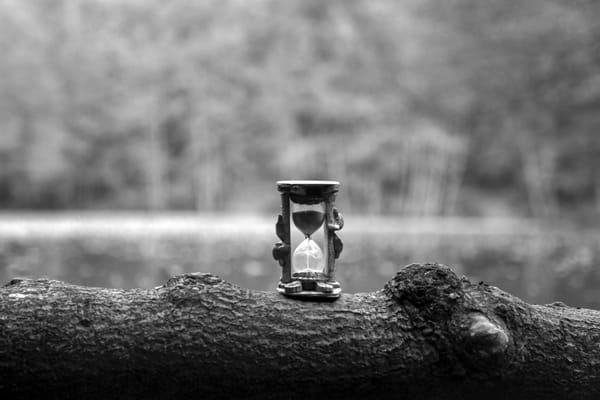free-writing: happiness in the future

Today was grand. The first thing I did after waking up (being woken up by D) in the morning at six was heading down to play with him. We spent a good two hours playing, following which KrA headed down and whipped up some yummy breakfast.
Normally, I'd have written off the day as a non-writing day by this point. After all, I had played with my child for two hours non-stop, I hadn't even gone for a morning walk because it was raining by then – not a good start to the day, the routine has already gone off-kilter – so surely I could cut myself some slack if my brain refused to cooperate.
Funnily though, I turned up at the writing computer and managed to write way more than I had written these past three days in just two writing sprints.
If I had to go back and analyse where the magic had sprung from, I suppose I could only say that the entire time I was with D, I was present.
Not thinking about all the writing I needed to get a head-start on. Nor about the fact that I'd miss going on a morning walk because it was pouring buckets out there. Not thinking that I ought to go for a walk even if it was pouring – didn't I have a daily streak to maintain? Not thinking that I'd miss picking fresh mulberries today. Not getting annoyed that KrA was oversleeping and we're beginning to starve here.
By 'not thinking' I mean that the thoughts did arise but I was able to swat them away with more than my usual alacrity.
It always, always comes back to this.
When we are present no matter what we do, life expands to make space for everything that matters to us.
After D had fallen asleep, I came across a book titled The Lazy Genius Way by Kendra Adachi and was reading the first few pages of it.
When I was growing up, the narrative was all about having a linear life – study hard, work hard, have a family, pass on the same values to our children. Non-fiction books presented an ideal way of life or work, the definition of 'ideal' resting with the author popular at the time, and ways to achieve that ideal way of living that would guarantee prosperity and a good life.
Now the narrative has shifted to the 'You do you' mentality. The ideal way of life is the one that works for you.
I'm beginning to see this in everything from parenting to cooking to running a business – even among author-entrepreneurs, the leading narrative is to quit trying to copy a 'formula' that may have worked for many others, quite trying stuff that does not work for us, and quit thinking that something must be wrong with us because we can't seem to get that darned formula to work for us the way others have managed to for themselves.
The narrative has now become 'Throw all prescriptive formulae out of the window.' 'Find what works for you and do that.'
So looks like we've come a full circle.
Know yourself. Do what works for you. The rest of the world be damned.
On that note, there was a conversation today that made us realise that now that the world is opening up, so have piano lessons and tennis lessons and skateboarding lessons and vacations and language classes and swimming lessons and the whole gamut of activities that the world tells us we 'should' be signing up our children for.
I'm glad to announce that KrA and I are on the same page as far as this madness is concerned. We've decided that we only need to stay sane, choose what matters to us, what brings us joy, what makes our heart sing, what makes us want to sing and dance and laugh and love and live, and focus on those alone.
It doesn't take a lot to build a wonderful life. It doesn't take anything at all. It takes a deep commitment to being true to ourselves, to keep coming back home no matter how often or how far we stray from what we truly desire, what we really enjoy.
Even as I wax eloquent about the beauty of a simple life, D has been making this manic shift from outgrowing his toys in a day or two and desiring for new ones. He received a lot of gifts for his birthday – one from us, a few sent by cousins, and a bunch of other stuff a family friend got for him the other day.
Not unexpectedly, he has grown bored of all the packages he has opened in the past ten days and is already looking forward to the next time he can buy something new. His suggestion? 'How about we get something in September to celebrate the start of SK?'
And at bedtime he was asking me about when he was scheduled to go to school for camp (it's two Mondays out) and he concluded that he'd receive a new toy the Sunday before! Why? To celebrate his return to school for camp! (Absolute Facepalm moment!)
My first reaction to this was one of concern. D has been a fairly content child so far, and I wonder if it has to do with all the Zoom classes in which he'd take something to show his teachers/friends on video. All that talk about things – what the kids have, what the kids do – that very trendy way of talking about the things we have or we do, the things that we can show off to others, surely must have impacted him in some way, made him more worldly, more materialistic!
My second reaction was to turn this inward. Have I been role-modelling a yearning for future happiness in some way? Surely I've grappled with sadness in his presence many, many times but I don't think I've ever thought or said that I'd be happy only if I had this thing or that.
Eventually, I decided that no matter where this behaviour has sprung from, right now I have the choice to address it more creatively – toy rotation, coming up with new ideas for what we'd like to do with the stuff that we have. Maybe writing down the different options could help. Having a visual might help.
I'm done blaming myself for the behavioural changes I observe in my child. Sure, as a parent I can role-model a lot of things, but I also have to acknowledge that the world out there values very different things than KrA and I do, and D is naturally bound to be influenced by all the shiny, sparkly things he sees outside. All I can do is help him navigate these – without losing my calm and without giving in to self-flagellation – and trust that as he grows older, he'll find his way out of the messes of his own making.
The beginning chapter of Adachi's book was so timely in addressing this dilemma that I wanted to share it here.
She talks about a time at the beach with her family when her husband dug a large hole in the sand and got their three kids to fill buckets of water to pour into the hole and fill it as quickly as they could. They played the game for a while, running from the ocean to the hole, hauling and pouring, hauling and pouring, in vain, and eventually moved on to play something else.
As they ran off to chase the birds, I saw the discarded buckets surrounding the empty hole and realized I was looking at a metaphor of my life. Maybe it's one for yours too.
Here's what we do as women. We pick our spot in the sand to dig a hole, checking to see if the women around us are choosing similar (or, gulp, better) spots, trying not to be distracted by their motherly patience and bikini bodies. We start digging, hoping the hole is deep enough and headed in the right direction. Where is it going? No idea, but who cares. Everyone else is digging, so we dig too.
Eventually, it's time to start hauling buckets to fill the hole. We carry load after load of "water" – color-coded calendars, room-mom responsibilities, meal plans, and work-life balance. We haul. We try. We sweat. And we watch that hole stay empty.
Now we're confused.
Does everyone else have this figured out? Is my hole too deep? And where is all the water going?
We pause to catch our breath, wondering if everyone else feels like an epic failure too. One person can't possibly keep up with a clean house, a fulfilling job, a well-adjusted family, an active social life, and a running regimen of fifteen miles a week, right?
With silence our only answer, we decide: No, it's just me. I need to get it together.
What follows is a flurry of habit trackers, calendar overhauls, and internet rabbit holes to figure out how to be better, until we pass out from emotional exhaustion or actual adrenal fatigue or we give up completely and head back to the beach house for a shame-filled margarita.
Cheers?
~ An excerpt from The Lazy Genius Way: Embrace What Matters, Ditch What Doesn't, and Get Stuff Done by Kendra Adachi
That's it from me for today!
À demain, tout le monde!
Image Attribution: Photo by Brad Switzer on Unsplash




